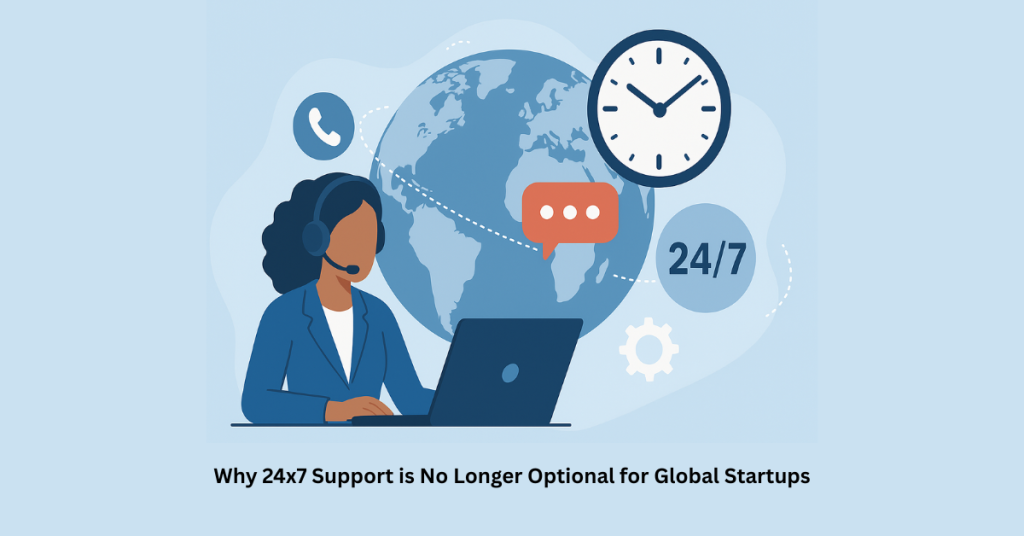Table of Contents
Introduction
The world has changed for startups. Ten years ago, a new company might have focused on one city, one region, or maybe one country. Today, even the smallest SaaS startup or e-commerce store can get customers from multiple continents within days of launch. Thanks to cloud platforms, digital payments, and social media marketing, borders no longer restrict growth.
But here’s the catch: customers don’t just buy globally—they also expect service globally. And when customers are in different time zones, there’s no such thing as “working hours.” This is why 24×7 support is no longer optional. It’s the lifeline that ensures businesses remain competitive, trustworthy, and ready to grow in a global market.
The Shift From “Business Hours” to “Always On”
Traditionally, support meant 9-to-5 operations. Customers had to wait until the business opened to get help. This model worked when companies were local and customer bases were limited. But the internet has completely changed expectations.
- Global markets mean global time zones. A customer in New York may log a ticket at midnight in San Francisco. Another in Dubai may need urgent assistance during European lunchtime.
- Digital services never sleep. Software, cloud platforms, payment gateways, and e-commerce sites run 24×7. Customers expect issues to be resolved with the same availability.
- Competition is fierce. If your competitor offers round-the-clock support while you don’t, customers will remember.
The bottom line: “business hours” are outdated. Customers live in an always-on world, and startups must adapt.
Why Customers Expect 24×7 Support from Day One
Startups often underestimate how quickly customers hold them to enterprise-level standards. Here’s why expectations are so high:
1. Trust Is Fragile in the Digital Economy
Imagine you’ve just signed up for a new payment app or SaaS tool. It looks promising—but suddenly, the system glitches. You reach out for help, only to discover support is closed until tomorrow. How likely are you to stick around?
For startups, every early customer interaction is a test of trust. A single outage or delayed response can feel like a deal-breaker, especially when customers have dozens of alternatives. 24×7 support builds confidence that you’re reliable, even when things go wrong.
2. Global Means Instant Scaling
The beauty of being digital is instant access to international markets. But with opportunity comes responsibility. If your product is being used in Australia, India, and Europe simultaneously, your support can’t just cater to one region.
Startups that treat global reach seriously position themselves as professional players, not just “small” companies. And customers notice.
3. Downtime Hurts More Than Missing Features
Customers can forgive a missing feature. What they don’t forgive is downtime. A payment gateway that’s unavailable for one hour during peak shopping season can cause losses for thousands of customers. Those customers won’t remember the fancy new features—they’ll remember the outage.
Consistent 24×7 support signals reliability, which is often more important than innovation.
The Business Case: Why 24×7 Support Accelerates Growth
It’s easy to think of round-the-clock support as a cost center. After all, it requires investment in staff, tools, and processes. But when framed correctly, it becomes a growth driver.
1. Meeting Enterprise SLA Requirements
B2B startups often target enterprise customers, who demand strict SLAs (Service Level Agreements). Many enterprise contracts require 99.9%+ uptime and guaranteed support response times. Without 24×7 support, it’s impossible to meet these commitments. And without meeting them, you can’t win enterprise deals.
2. Preventing Customer Churn
Retention is the biggest growth lever for startups. Acquiring new customers is expensive; keeping them is cheaper. When customers know they can rely on quick responses at any time, they are less likely to churn.
3. Creating a Competitive Edge
Many startups underestimate how much of a differentiator strong customer support can be. In crowded industries, excellent 24×7 support becomes a selling point. Customers often choose reliability over extra features, and support is reliability in action.
4. Supporting Rapid International Expansion
If your startup is eyeing growth in the U.S., Europe, and Asia, your support model must scale. Having 24×7 support built into your foundation means you’re ready to expand without friction.
How Startups Can Deliver 24×7 Support Without Burning Out
One of the biggest concerns for startups is resource constraints. “We can’t afford to staff a support desk around the clock,” many founders argue. But the reality is, 24×7 support is achievable without breaking the bank.
1. Leverage Global Teams
Distributed teams are more accessible than ever. By hiring or partnering with staff across time zones, startups can provide round-the-clock coverage without requiring night shifts in one location.
2. Invest in Self-Service Tools
AI-powered chatbots, knowledge bases, and FAQ portals can handle many Tier-1 issues automatically. Customers appreciate quick answers, even if they’re automated, as long as the experience feels helpful.
3. Use Outsourcing Strategically
Specialized support providers can offer 24×7 support coverage at scale. For early-stage startups, outsourcing the first line of support ensures global availability while in-house teams focus on product innovation.
4. Prioritize Critical Coverage First
Not every startup needs a fully staffed global helpdesk immediately. Start small by offering critical support—such as incident response—for urgent issues around the clock. Then expand coverage as customer demand grows.
5. Implement Smart Monitoring and Alerting
Round-the-clock support isn’t just about human agents. Proactive monitoring of infrastructure, applications, and networks can catch problems before customers even notice. Combine this with on-call staff rotation, and you’ve got a lean but effective model.
24×7 Support as a Culture, Not Just a Department
A critical mistake startups make is treating 24×7 support as just another operational checkbox. The most successful companies embed it into their culture.
- Founders should set the tone. Showing customers that leadership is committed to reliability builds trust.
- Engineering and support must work together. Escalations should flow smoothly, with no silos between product and support.
- Every customer interaction is branding. A quick resolution at 3 a.m. may impress a customer more than a marketing campaign.
When 24×7 support is part of your DNA, customers feel it. They sense that you care about their success at all times, not just when convenient for you.
Real-World Example: Startups That Thrived with 24×7 Support
Consider a SaaS company targeting global e-commerce merchants. Their early customers included stores in Asia, the Middle East, and the U.S. Initially, they ran support only during U.S. working hours. Customers in Asia experienced long delays for urgent issues, leading to complaints and churn.
When the company introduced 24×7 support through a combination of outsourced Tier-1 support and internal on-call escalation, customer satisfaction skyrocketed. Churn dropped by 30%, and enterprise clients became easier to close because SLA commitments were met.
In just one year, 24×7 support shifted from being an overhead cost to being one of their strongest growth enablers.
The Future: Why 24×7 Support Will Become the Norm
The startup ecosystem is evolving fast. Remote-first teams, global customer bases, and digital-first services make round-the-clock availability inevitable. AI will play a growing role in handling first-level queries, but human support will still be essential for complex issues.
Over the next decade, customers won’t even ask whether companies provide 24×7 support—they will assume it’s a given. Startups that adopt this mindset early will build stronger reputations, attract larger customers, and accelerate growth faster than competitors.
Conclusion
For global startups, the question isn’t “Can we afford 24×7 support?” The real question is “Can we afford not to have it?”
- Customers expect availability from day one.
- Trust and reputation are built—or broken—during outages.
- Enterprise-level growth requires SLA compliance.
- Round-the-clock coverage accelerates international expansion.
By embracing 24×7 support as a growth enabler instead of a cost center, startups position themselves to thrive in an always-on world. It’s no longer optional—it’s a competitive necessity.
Frequently Asked Questions
1. Why is 24×7 support important for global startups?
24×7 support ensures customers across all time zones get immediate help, which builds trust, prevents churn, and supports international growth from day one.
2. How does 24×7 support help startups scale globally?
It eliminates time zone gaps, meets enterprise SLA requirements, and creates a competitive edge, making it easier for startups to expand into multiple regions.
3. Can small startups afford 24×7 support?
Yes. Startups can begin with strategic outsourcing, distributed teams, and AI-powered self-service tools to deliver 24×7 support without huge costs.
4. Is 24×7 support only about customer service?
No. 24×7 support is also about proactive monitoring, incident response, and reliability. It’s a cultural commitment that positions startups for long-term growth.






